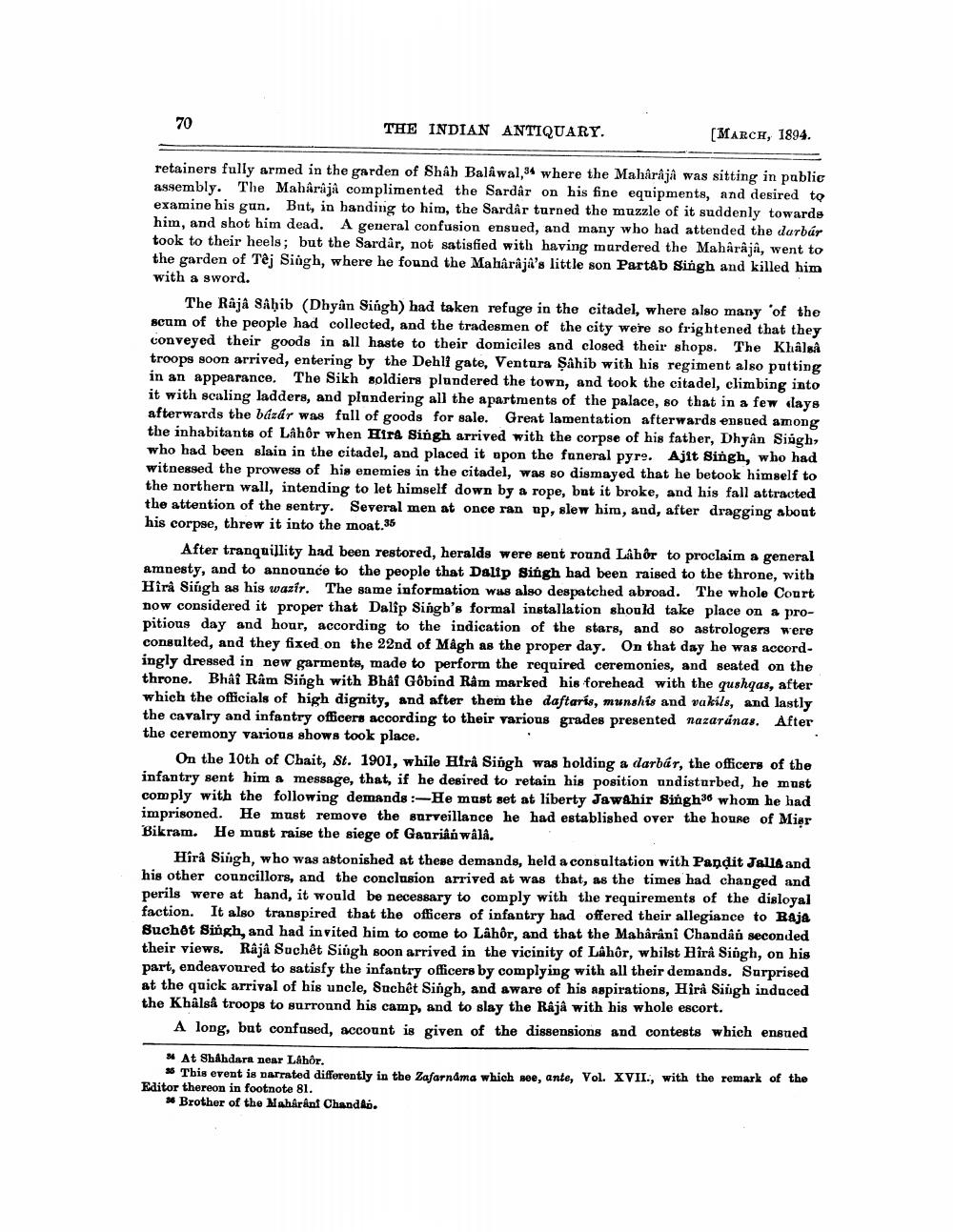________________
70
THE INDIAN ANTIQUARY.
[MARCH, 1894.
retainers fully armed in the garden of Shah Balawal,34 where the Maharaja was sitting in public assembly. The Maharaja complimented the Sardâr on his fine equipments, and desired to examine his gun. But, in handing to him, the Sardar turned the muzzle of it suddenly towards him, and shot him dead. A general confusion ensued, and many who had attended the darbár took to their heels; but the Sardar, not satisfied with having murdered the Mahârâjâ, went to the garden of Tej Singh, where he found the Maharaja's little son Partab Singh and killed him with a sword.
The Râjâ Sahib (Dhyan Singh) had taken refuge in the citadel, where also many of the scum of the people had collected, and the tradesmen of the city were so frightened that they conveyed their goods in all haste to their domiciles and closed their shops. The Khâlgâ troops soon arrived, entering by the Dehli gate, Ventura Şahib with his regiment also putting in an appearance. The Sikh soldiers plundered the town, and took the citadel, elimbing into it with scaling ladders, and plundering all the apartments of the palace, so that in a few days afterwards the bázár was full of goods for sale. Great lamentation afterwards ensued among the inhabitants of Lähôr when Hira Singh arrived with the corpse of his father, Dhyan Siógh, who had been slain in the citadel, and placed it upon the funeral pyre. Ajit Singh, who had witnessed the prowess of his enemies in the citadel, was so dismayed that he betook himself to the northern wall, intending to let himself down by a rope, but it broke, and his fall attracted the attention of the sentry. Several men at once ran up, slew him, and, after dragging aboat his corpse, threw it into the moat.35
After tranquillity had been restored, heralds were sent round Lähôr to proclaim a general amnesty, and to announce to the people that Dalip Singh had been raised to the throne, with Hira Singh as his wazir. The same information was also despatched abroad. The whole Court now considered it proper that Dalip Singh's formal installation should take place on a propitious day and hour, according to the indication of the stars, and so astrologers were consulted, and they fixed on the 22nd of Mâgh as the proper day. On that day he was accordingly dressed in new garments, made to perform the required ceremonies, and seated on the throne. Bhâî Râm Singh with Bhai Gôbind Râm marked his forehead with the qushqas, after which the officials of high dignity, and after them the daftarís, munshis and vakils, and lastly the cavalry and infantry officers according to their various grades presented nazaránas. After the ceremony various shows took place.
On the 10th of Chait, St. 1901, while Hfrá Siógh was holding a darbár, the officers of the infantry sent him a message, that, if he desired to retain his position undisturbed, he must comply with the following demands :-He must set at liberty Jawahir Singh36 whom he had imprisoned. He must remove the surveillance he had established over the house of Misr Bikram. He must raise the siege of Gauriko wala
Hira Singh, who was astonished at these demands, held a consultation with Pandit Jalla and his other councillors, and the conclusion arrived at was that, as the times had changed and perils were at hand, it would be necessary to comply with the requirements of the disloyal faction. It also transpired that the officers of infantry had offered their allegiance to Baje Suchot Singh, and had invited him to come to Lâhôr, and that the Maharani Chandaó seconded their views. Raja Suchết Siúgh soon arrived in the vicinity of Lahôr, whilst Hîra Singh, on his part, endeavoured to satisfy the infantry officers by complying with all their demands. Surprised at the quick arrival of his uncle, Suchết Singh, and aware of his aspirations, Hîrâ Singh induced the Khâlså troops to surround his camp, and to slay the Râjâ with his whole escort.
A long, but confused, account is given of the dissensions and contests which ensued
* At Shahdara near Láhôr.
* This event is narrated differently in the Zafarndma which see, ante, Vol. XVII., with the remark of the Editor thereon in footnote 81.
* Brother of the Maharani ChandAD.




